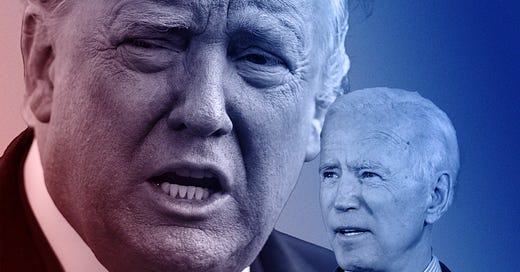Will the American Fever at Last Break?
In a blatantly anti-democratic speech, Trump demands states stop counting ballots. As of early morning, though, Biden still has a chance to win.
When a fever breaks, the human body must adjust to its own recovery. It breaks into a sweat until, gradually, the temperature lowers and the sufferer feels the dawn of normality. So it will work, we can only hope, with America’s body politic.
But such a recovery now hangs in the balance. Our collective symptomatology is multifarious—and severe. We are gripped by a deadly and resurgent pandemic; mired in an economic crisis which eviscerates expectations; afflicted by a distrust and division which turns our political organism on itself; uncertain, even, that we retain the capacity to conduct a democratic election and facilitate a peaceful transition of power. All these ills have permeated our tremulous choice of which man should lead us.
Yet something even more remarkable and terrible has happened, a last corruption of our societal antibodies: The ultimate issue in this election has become the toxic inner landscape of America’s president. Trump’s campaign is, in the end, not about issues or even about us—in his implacable solipsism, he has made our national reckoning about his grievances, resentments, and sheer hatred of anyone or anything which intrudes on the alternate reality in which he struts the stage alone. We are but props in his psychodrama of self.
So meaningless to Trump is democracy that he is openly scheming to discard ballots, preempt election returns, and convert the Supreme Court into ward heelers in robes who exist to help him steal the presidency. This transcends incipient autocracy—it is one man’s mental pathology imposed on a constitutional order which, to him, is no more real than the death and suffering wrought by COVID-19.
But character is, indeed, fate. So there is something both Shakespearean and viscerally elegant about the redemptive turn of history’s wheel: The man poised to depose Trump—if only he can—is Joe Biden.
For so long this seemed so unlikely as to be unthinkable. The younger Biden’s flaws were well-known: He was garrulous, insecure, ideologically unmoored. He had run two utterly failed presidential campaigns, 20 years apart, only to be plucked from the Senate near the presumptive end of his career by an African-American presidential nominee in search of an experienced hand who had outlived his ambitions. And Biden’s seeming last chance—in 2016—was undone by the death of a son and the collective judgment of party grandees that Hillary Clinton was better suited to win.
Instead Donald Trump became president.
Perhaps it was this contrast that helped us perceive the fineness which existed alongside Joe Biden’s faults. He cared deeply about people—their concerns, their hopes, their pain were real to him. He had the wisdom to grow. He believed in an idea beyond self: the institutions of constitutional democracy, and the decency and self-restraint essential to their preservation. In his origins and manner, he personified ordinary America, but armed with an extraordinary resilience which enabled him to endure the death of those he loved and to nurture those who survived.
He was more than the antithesis of Donald Trump: Tempered by time, he inspired the trust essential to restoring societal wellness.
Most remarkable, perhaps, deep into his seventies he proved himself as never before. During the primary season, he came back from near oblivion to unify his party. Under the extraordinary circumstances of the pandemic, he ran a near-flawless general election campaign, making history by choosing a woman of color as his running mate. He overrode the endless condescension—he was too old; too shaky; too fragile in debate; too flawed in judgment. It was Trump, not Biden, who cracked under pressure.
So here he was as the first returns came in, favored to win, yet suspended like millions of others between hope and a doubt deepened by the recollection of the awful astonishment of November 8, 2016.
Anyone desperate for relief from Trump was hoping for an overnight cure: victories in two battleground states on the razor’s edge, Florida and North Carolina, and even red states where polls held out hope. But within hours North Carolina slipped away, and Florida justified the eleventh-hour misgivings of Democratic professionals who saw Cuban-Americans shunning Biden in prohibitive numbers. And those bright shiny objects like Texas and Ohio turned out to be fool’s gold, leaving behind only lingering hopes for Georgia.
The returns suggested that suburban voters, particularly women, were abandoning the GOP. While this did not augur the massive rejection of Trump that Democrats longed for, it suggested a socioeconomic shift which could prove electorally crucial in the agonizing days to come.
Biden’s first apparent breakthrough victory of the night came in Arizona. His wins as of midnight otherwise replicated the path Hillary Clinton had taken to 232 votes. Add Arizona and Biden reaches 243. That hardly seems decisive. But then add Biden’s victory in the second district of Nebraska, with its one electoral vote, and Pennsylvania could become mathematically irrelevant. Michigan’s 16 votes, combined with Wisconsin’s 10, would give Biden precisely 270 votes.
Slow election-day returns from Democratic-leaning counties and the later tabulation of mail-in ballots in Wisconsin and Michigan suggests that Biden may yet win in those states, as the polls predicted. But the results may remain undecided until Wednesday—or even later in the week.
In remarks delivered at 2:21 a.m., the president declared victory and threatened to go to the Supreme Court to cut off the counting of ballots—presumably in the Rust Belt states, where he leads in the incomplete early counts. There is absolutely no legal basis for doing so, and for the Court to intrude would eviscerate its own legitimacy. And with luck, if Biden wins in Arizona, Michigan and Wisconsin will preempt Trump’s plan to exploit legal disputes over mail-in ballots in Pennsylvania by asking the Supreme Court to decide the election.
As of this writing, there still remains the hope that our national fever will at last abate—because the agent of illness would be expelled from our body politic. But the cure, like the disease, will come at a cost.






